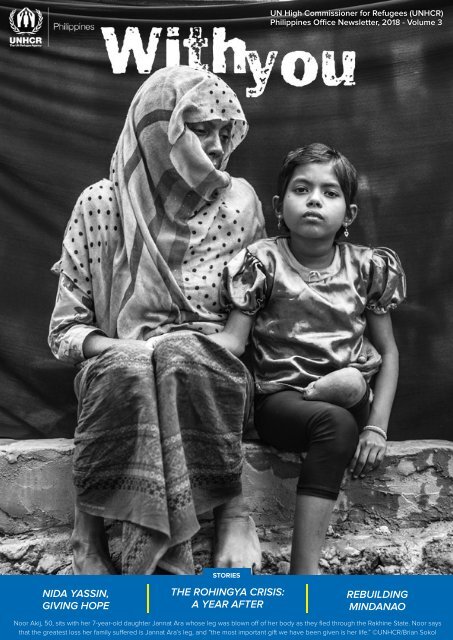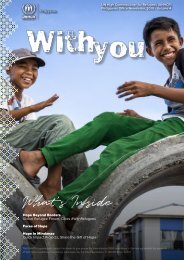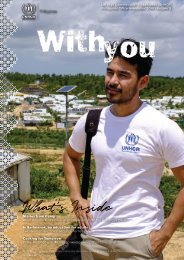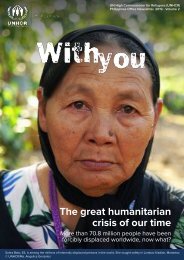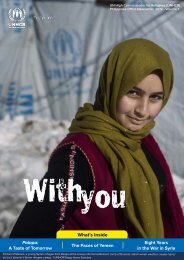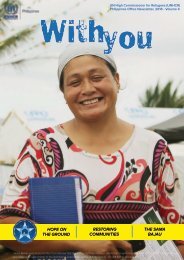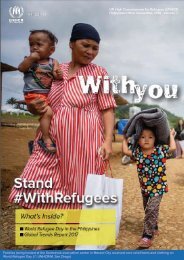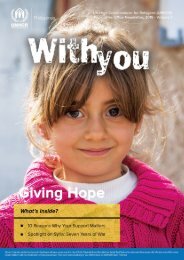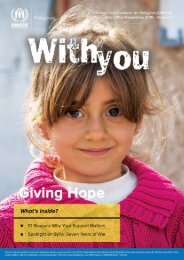Create successful ePaper yourself
Turn your PDF publications into a flip-book with our unique Google optimized e-Paper software.
UN High Commissioner for Refugees (UNHCR)<br />
Philippines Office Newsletter, <strong>2018</strong> - <strong>Volume</strong> 3<br />
NIDA YASSIN,<br />
GIVING HOPE<br />
STORIES<br />
THE ROHINGYA CRISIS:<br />
A YEAR AFTER<br />
REBUILDING<br />
MINDANAO<br />
Noor Akij, 50, sits with her 7-year-old daughter Jannat Ara whose leg was blown off of her body as they fled through the Rakhine State. Noor says<br />
that the greatest loss her family suffered is Jannat Ara’s leg, and “the most important gift we have been given is her life.” ©UNHCR/Brian Sokol
Message from the Representative<br />
Special Feature<br />
To our valued donor,<br />
A person is forced to flee every two seconds. Every<br />
day, we hear stories of men, women, and children who<br />
are torn from their homes across the world. In 2017,<br />
displacement has reached a record high with nearly 68.5<br />
million people forced to flee because of war, violence,<br />
conflict, and persecution. These are daunting and heartbreaking<br />
numbers.<br />
Rebuilding Mindanao<br />
Supporting families in the region through quick impact projects<br />
Yet, still there is hope. Hope from the compassionate<br />
men and women who extend a hand to families who lost<br />
everything.<br />
©UNHCR<br />
In 2015, I was in Nepal when an 8.1 magnitude<br />
earthquake struck. I saw how buildings were flattened<br />
and families would search through the rubble for<br />
survivors. Just last year, I was stationed in Bangladesh<br />
where I worked with a number of professional<br />
humanitairans from the Philippines including UNHCR staff<br />
members Alvin Gonzaga and Brenda Escalante. We were<br />
responding to one of the worst humanitarian crisis of our<br />
time. During our work in the Rohingya camps, we could<br />
see in their eyes the horror that they saw when they were<br />
chased out of their homes.<br />
In August <strong>2018</strong>, Mr. Shinji Kubo assumed<br />
his new role as the Representative of<br />
UNHCR to the Philippines. He brings with<br />
him 25 years of experience with the UN<br />
Refugee Agency, having recently served<br />
as its Representative to Bangladesh at<br />
the onset of the Rohingya refugee crisis<br />
in 2017, and as the Head of Sub-Office in<br />
Damak, Nepal when the country was hit by<br />
an earthquake in 2015. Mr. Kubo has been<br />
involved in various units in different UNHCR<br />
operations, with his experience spanning<br />
protection, external relations, and durable<br />
solutions. Aside from his native Japan, he<br />
has also been previously stationed in Sri<br />
Lanka, Indonesia, Cambodia, and Malaysia.<br />
Prior to joining the humanitarian sector,<br />
Mr. Kubo worked in the field of law. He<br />
graduated from Soka University in Japan<br />
with a Masters in Law. He received his<br />
Bachelor of Laws from the same university.<br />
“It was the outpouring of kindness<br />
from donors and supporters all over<br />
the world including the Philippines that<br />
gave me hope.”<br />
2 With You | Vol. 3, <strong>2018</strong><br />
It was during those times that I witnessed how<br />
communities would stand in solidarity to help the families<br />
who have lost everything. There were people ©UNHCR/G. who Goodwin<br />
opened their homes and gave what they could just to<br />
help.<br />
It was the outpouring of kindness from donors and<br />
supporters all over the world including the Philippines<br />
that gave me hope. Your support has helped UNHCR<br />
do its work as soon as an emergency strikes up to the<br />
point that they are able to rebuild their lives in their home<br />
country or in a different community. Truly, you are part of<br />
a community of hope-givers making our work possible.<br />
Every peso you donate makes a difference in the lives<br />
of forcibly displaced families. This issue of With You<br />
will share how you have made a lasting impact on the<br />
lives of the most vulnerable families in the Philippines,<br />
Bangladesh, and other parts of the world.<br />
UNHCR does it’s best to do the right thing to help<br />
forcibly displaced families. We cannot do this without<br />
you. As I take on my new role as UNHCR Philippines’<br />
Representative, I am motivated that together we can<br />
continue to save lives, safeguard rights, and build better<br />
futures for families not just in the Philippines, but also<br />
across the globe.<br />
Maraming salamat po.<br />
Sincerely,<br />
Shinji Kubo<br />
Representative<br />
UNHCR Philippines<br />
*Note: Figures include direct and indirect beneficiaries<br />
Families in Mindanao have been forced to flee from<br />
their home due to conflict, clan feuds, and flooding.<br />
It is through your monthly gift that UNHCR is able to<br />
implement quick impact projects to help address the<br />
needs of the forcibly displaced over the past third<br />
quarter of the year.<br />
Quick impact projects are low cost projects meant to<br />
respond to the basic priority needs expressed by the<br />
displaced families and the communities where they<br />
are being hosted. Community members are involved<br />
in every step of the project from planning, designing<br />
and implementation of these high impact projects.<br />
Projects are designed to address the needs of<br />
families such as accessing basic social services,<br />
providing livelihood assistance, and improving<br />
community empowerment and social impact.<br />
It is through the committed support of donors like<br />
you that UNHCR is able to help displaced families<br />
get back on their feet. You help restore hope to<br />
more than 12,198 families in Mindanao.<br />
With You | Vol. 3, <strong>2018</strong><br />
3
Special Feature<br />
Special Feature<br />
It has been 13 months since one of the worst<br />
humanitarian crisis of our time erupted. On 25 August<br />
<strong>2018</strong>, hundreds of thousands of the Rohingya people<br />
began their long and grueling journey towards safety.<br />
More than 700,000 Rohingya refugees fled from their<br />
home in Myanmar due to the inhuman violence that<br />
broke out in the Rakhine state.<br />
searched for the infant’s family, but no one claimed<br />
him in the site. She and her husband now take care<br />
of the baby. They named Mohammed Hasan, after<br />
the prophet Mohammed’s grandson. She hopes that<br />
Mohammed will grow up to become a strong man.<br />
OMAR<br />
The men, women, and children who fled recounted<br />
stories of trauma. Yet, they also share stories of the<br />
most important things they took with them and their<br />
dreams for the future.<br />
KALIMA*<br />
The 20-year-old says that nothing is important to her<br />
after the hardships that she faced in Myanmar. She<br />
was a tailor in her village when armed men came and<br />
began shooting people. They burned houses, and<br />
killed villlagers and left a trail of destruction in their<br />
wake.<br />
“I don’t know why Allah did not let me die,” Kalima<br />
said. She was married for three months when she<br />
witnessed the men slaughter people in her village.<br />
Kalima recalls how her children and houses were<br />
set on fire, how her husband and little sister were<br />
killed. She was then brutally beaten and raped before<br />
being knocked unconscious. Kalima escaped with<br />
her brother and cousin. They walked for three days<br />
before arriving to Bangladesh.<br />
Omar was 102-years-old when he was forced to<br />
flee because of the attacks and brutal killings in a<br />
neighboring village. The blind man escaped with<br />
other members of his village, bringing with him a<br />
walking stick.<br />
Leaving his village was the hardest thing he had<br />
ever done. But now, Omar is reunited with his family<br />
in a camp. He feels safe and at peace.<br />
Kalima, Nuras, and Omar are some of the 720,000<br />
Rohingya refugees living in Bangladesh. It is through<br />
your generosity and kindness that UNHCR is able<br />
to restore hope to many of the most vulnerable<br />
Rohingya families who have lost everything.<br />
*name changed for protection<br />
YOUR HELP IN NUMBERS<br />
Inspite of going through such unspeakable horror,<br />
Kalima still manages to smile when asked about her<br />
talents as a dressmaker. “Anything you need,” she<br />
says when asked about what she can tailor. She<br />
dreams of one day being able to sew again.<br />
600,000 Rohingya refugees<br />
in Kutupalong, the largest resettlement site<br />
THE ROHINGYA<br />
CRISIS: A YEAR<br />
AFTER<br />
Icons by Freepik and mynamepong from Flaticon<br />
NURAS<br />
Nuras, a 25-year-old mother recalls how her<br />
neighbors were slaughtered as they tried to flee<br />
from their houses. Nuras and her four children ran<br />
away from their homes as they were chased and<br />
fired at. She ran with her four children to escape the<br />
massacre of her village.<br />
As she was fleeing, she heard the sound of a baby<br />
crying nearby. The infant was dry, flailing, and<br />
huddled between two dead bodies in a rice paddy.<br />
She took the child in her arms and resumed the<br />
journey with her children. They walked for days until<br />
they reached the Bangladeshi border where she<br />
was reunited with her husband who fled earlier. They<br />
267 learning centers<br />
37,400 families<br />
relocated to safer ground<br />
440 wells and pumps<br />
provide safe and clean water<br />
250,000 refugees<br />
access to primary healthcare<br />
22 nutrition centers<br />
for mothers and children<br />
43,853 hygiene kits<br />
4 With You | Vol. 3, <strong>2018</strong><br />
©UNHCR/ Brian Sokol<br />
Sources: PSP Emergency Content Package, August <strong>2018</strong> and<br />
UNHCR Bangladesh Refugee Emergency Factsheet—Energy & Environment, August <strong>2018</strong><br />
With You | Vol. 3, <strong>2018</strong><br />
5
Staff Speaks<br />
Special Feature<br />
Notes from the field by Nida Yassin<br />
Za’atari Camp, 2013<br />
“Frazzled from a heavy workload, I jumped<br />
out of my office pre-fab, looking for fresh air in<br />
a sandy area. In the opposite corner I found a<br />
little girl, covered in dust, biting her nails and<br />
looking scared.<br />
I approached her softly. I could see the tears<br />
pouring down her thin, little dusty cheeks. She<br />
was crying quietly. I asked her if I could be<br />
her friend. She looked at me and nodded. I<br />
sat her on my lap and held her, tried soothing<br />
her. I could hardly see the details of her feet in<br />
the chalky mini-slippers of hers, worn on the<br />
wrong feet. She was too shy to look at me;<br />
I started asking her about her parents and<br />
siblings. She didn’t respond. And then, while<br />
I sat there with her seated on my lap and<br />
patting her back, she finally looked up at me,<br />
straight into my eyes, and said, ‘water.’<br />
And it was my turn to bawl. Amneh, a 4 year<br />
old Syrian refugee, who touched my heart.”<br />
Nida Yassin, Giving Hope<br />
Be inspired by Assistant External Relations Officer Nida Yassin’s dedication to<br />
speaking on behalf of refugees, some of the most vulnerable people of our time.<br />
© UNHCR/Sebastian Rich<br />
The gift of shelter<br />
© UNHCR<br />
UNHCR Field Officer Brenda Escalante with Rohingya children in a refugee camp in Bangladesh. UNHCR provides much-needed shelter<br />
assistance to protect the most vulnerable Rohingya refugees.<br />
Why did you choose to work in the humanitarian sector in<br />
particular?<br />
I didn’t choose to work for UNHCR, I think UNHCR chose<br />
me to work with them.<br />
My father is a Palestinian refugee, and I know exactly what<br />
he went through. Growing up, I listened to his stories about<br />
being a refugee—how he left his homeland for his family,<br />
and that journey to safety. And while growing up, I felt<br />
that I wanted to be a part of the UN and to make as much<br />
possible of my capabilities to make it better for refugees.<br />
What was the best day you had at work?<br />
It was after the Government of Jordan has allowed<br />
refugees to work legally here, and there were certain<br />
challenges in terms of refugees applying for jobs and that<br />
their skills and talents were not very well known.<br />
So, with the refugees community and with the employer<br />
community, we held the very first winter bazaar in UNHCR.<br />
It had a small scale and was very low key, and lasted for<br />
three days. But the smiles and the encouragement that<br />
the refugees got from the organizers of the bazaar was<br />
something remarkable, something that I would not trade<br />
anything for.<br />
What do you think are the misconceptions about refugees?<br />
Home is dear to anyone; it doesn’t matter if there is a crisis<br />
or not. So imagine how it is for those who have left forcibly. A<br />
lot of the refugees from Syria left with the idea that they were<br />
leaving for a few hours, and then they’ll go back home. That<br />
they’ll just stand behind the tree until the bombing is done.<br />
But they ended up at the borders with Jordan so they came<br />
with literally nothing. And it’s been more than seven years<br />
into the war, and what would happen later to them?<br />
This is what I love about UNHCR: That we are here to<br />
support them, we are here to provide whatever they lack,<br />
whatever we and they took for granted for the past years,<br />
now it actually counts, it makes a difference. This is the<br />
most important role of UNHCR: It is to protect those and to<br />
safeguard their rights and safety.<br />
Can you share a message to our supporters in the<br />
Philippines?<br />
Thank you so much to the people of the Philippines for their<br />
support that has been provided to the Syrian refugees.<br />
The needs are growing, and the years have been passing<br />
by so quickly. It has been seven years into the war and the<br />
refugees that we have been supporting are now in urgent<br />
and greater need of your assistance and your solidarity.<br />
Icons by Mangsaburu and Zlatko Najdenovski from Flaticon<br />
For years, UNHCR has been helping shelter thousands<br />
who have endured difficult journeys in search of safety.<br />
After undergoing such violence and trauma, Rohingya<br />
families were able to find safety in Bangladesh. Yet for<br />
months, they were at risk of some of the heaviest rains<br />
ever seen in the country.<br />
Through your generosity we have been able to give<br />
vulnerable families the safety, warmth, and protection<br />
they need. It is because of your kind gift that we are<br />
able to help build shelters for Rohingya refugees and<br />
other forcibly displaced families in emergency hotspots<br />
like Iraq, Kenya, and Uganda.<br />
Together, we can continue delivering much needed<br />
shelter aid to families who have been forced to flee.<br />
Your support can help us provide emergency shelters,<br />
improve existing settlements, support the most<br />
vulnerable families in building durable shelters.<br />
37,400 Rohingya refugees<br />
at risk during the monsoon season<br />
moved to higher ground<br />
12,500 men,<br />
women and children<br />
sheltered in collective<br />
homes in Iraq<br />
13,603 shelters<br />
provided to the most<br />
vulnerable families in<br />
Uganda<br />
1,500 accessible homes<br />
constructed for families caring for<br />
those with disabilities in Kenya<br />
6 With You | Vol. 3, <strong>2018</strong><br />
You have done a great job. Please continue to stand with<br />
refugees.<br />
Source: Shelter Response, July <strong>2018</strong> (Uganda) and Shelter Campaign Update 3, May <strong>2018</strong><br />
With You | Vol. 3, <strong>2018</strong> 7
© UNHCR/Martin San Diego<br />
donate.unhcr.ph<br />
UNHCRPhilippines<br />
phimapsfr@unhcr.org<br />
unhcr.org/ph<br />
UNHCRph<br />
unhcrph


